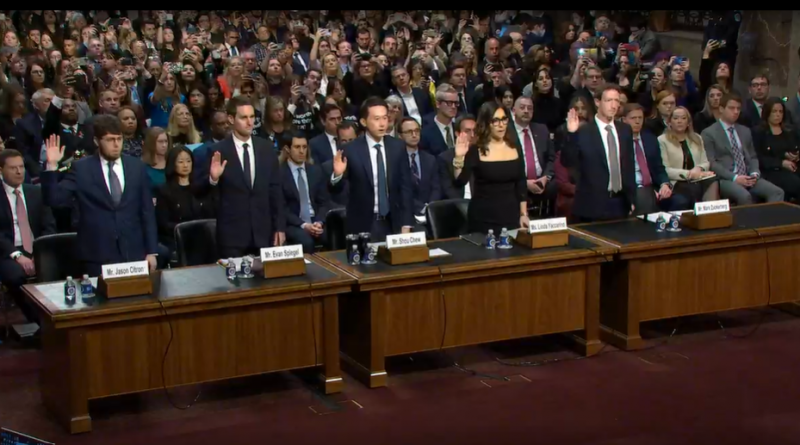Big Tech Executives Face Emotional Senate Hearing Amid Calls for Child Safety Legislation
Mark Walier
Tech Editor
In an emotionally charged Senate hearing, Meta CEO Mark Zuckerberg apologized to families of child abuse victims, acknowledging the gravity of the harm caused by social media platforms. The session, which included executives from TikTok, X, Snap, and Discord, underscored lawmakers’ desperation to implement new protections for children online.
Lawmakers drew parallels between tech companies and industries like Big Tobacco and Boeing, accusing them of having “blood on their hands.” Sen. Lindsey Graham’s remark encapsulated the heightened tension in the room, emphasizing the urgent need for accountability and change.
The hearing, lasting nearly four hours, contained many poignant moments as families directly affected by online harm sat behind tech leaders. The emotional testimonies prompted Zuckerberg’s rare gesture of rising from his chair to issue a heartfelt apology. Sen. Josh Hawley pressed Zuckerberg to acknowledge Meta’s wrongdoing, leading to the CEO’s expression of remorse: “I’m sorry for everything you have all been through.”

This unprecedented session highlighted lawmakers’ frustration over the glacial pace of child safety legislation. Despite numerous hearings with tech executives in recent years, progress has been slow. Sen. Amy Klobuchar vocalized this sentiment, stating, “There’s been so much talk at these hearings, and I just want to get this stuff done. I’m so tired of this.”
The focus of the hearing was child sexual abuse material (CSAM), with lawmakers pushing for stronger protections to prevent children from exposure to harmful content online. The Senate Judiciary Committee aimed to build momentum for a package of bills addressing child abuse material online. These bills, introduced in May with bipartisan support, include measures to allow victims to sue companies for facilitation and to make it more challenging for platforms to dismiss such lawsuits.
However, despite initial bipartisan support, these bills have stalled, leaving lawmakers frustrated with Congress’s inability to take swift action. States have stepped in with their own laws, either requiring tech companies to enhance privacy and safety features or restricting teens’ access to social media without parental approval. Yet, these state-level efforts face legal challenges, emphasizing the necessity of federal legislation.
Lawmakers acknowledged their share of blame for the ongoing issues with child abuse on the internet. Sen. Graham admitted, “Do we bear some of the blame? Absolutely.” However, he emphasized the potential for Congress to rectify the matter with the support of affected families.

Families made a powerful statement before the CEOs’ testimonies, holding up pictures of their loved ones who suffered harm from online platforms. Throughout the hearing, child safety advocates jeered at the executives’ reassurances and applauded senators pledging accountability.
Big Tech executives, including TikTok’s Shou Zi Chew and X’s Linda Yaccarino, faced tough questioning. Zuckerberg highlighted Meta’s safety investments and policy changes, calling on Congress to involve app store giants in vetting children’s ages online. Yaccarino outlined X’s plans for a new safety team in Texas, while Chew emphasized TikTok’s older user demographic.
Despite these commitments, lawmakers remained unsatisfied, pressing the CEOs for clear stances on the proposed legislation. Snap’s Evan Spiegel endorsed a bipartisan bill for stronger privacy and safety protections for children, while Yaccarino supported a measure holding companies liable for facilitating child abuse.
Some parents in attendance were unswayed by the CEOs’ remarks, considering them disingenuous. They emphasized the need for concrete actions and legislative changes to prioritize the safety of children online. The emotional testimonies and the families’ presence underscored the urgency for meaningful legislation to address the issues surrounding child safety on social media platforms.
In the era of addictive social media use, the Senate hearing addressing child safety on online platforms resonates not only with parents and lawmakers but also with college students. As young adults navigating the digital landscape, college students are important stakeholders in the ongoing discussion around social media responsibility. The issues discussed in the hearing, from the potential harm caused by online platforms to the urgent need for legislative measures, emphasize the broader societal impact of technology. The outcome of these discussions and the legislative actions will certainly shape the online environment for the foreseeable future.
Contact Mark at mark.walier@student.shu.edu

